Ethical Dilemmas in IT Security
VerifiedAdded on 2020/02/24
|5
|1029
|46
AI Summary
This assignment delves into the ethical complexities encountered by IT security personnel. It highlights how professionals can be tempted to prioritize profit over client well-being, such as suggesting unnecessary security measures or manipulating data for financial gain. The paper examines two key ethical dilemmas: overselling services and recommending open-source networks despite potential drawbacks. It also discusses the IEEE CS/ACM code of ethics and its four principles – public good, best interest of clients, high standards, and integrity – emphasizing their importance in navigating these dilemmas.
Contribute Materials
Your contribution can guide someone’s learning journey. Share your
documents today.
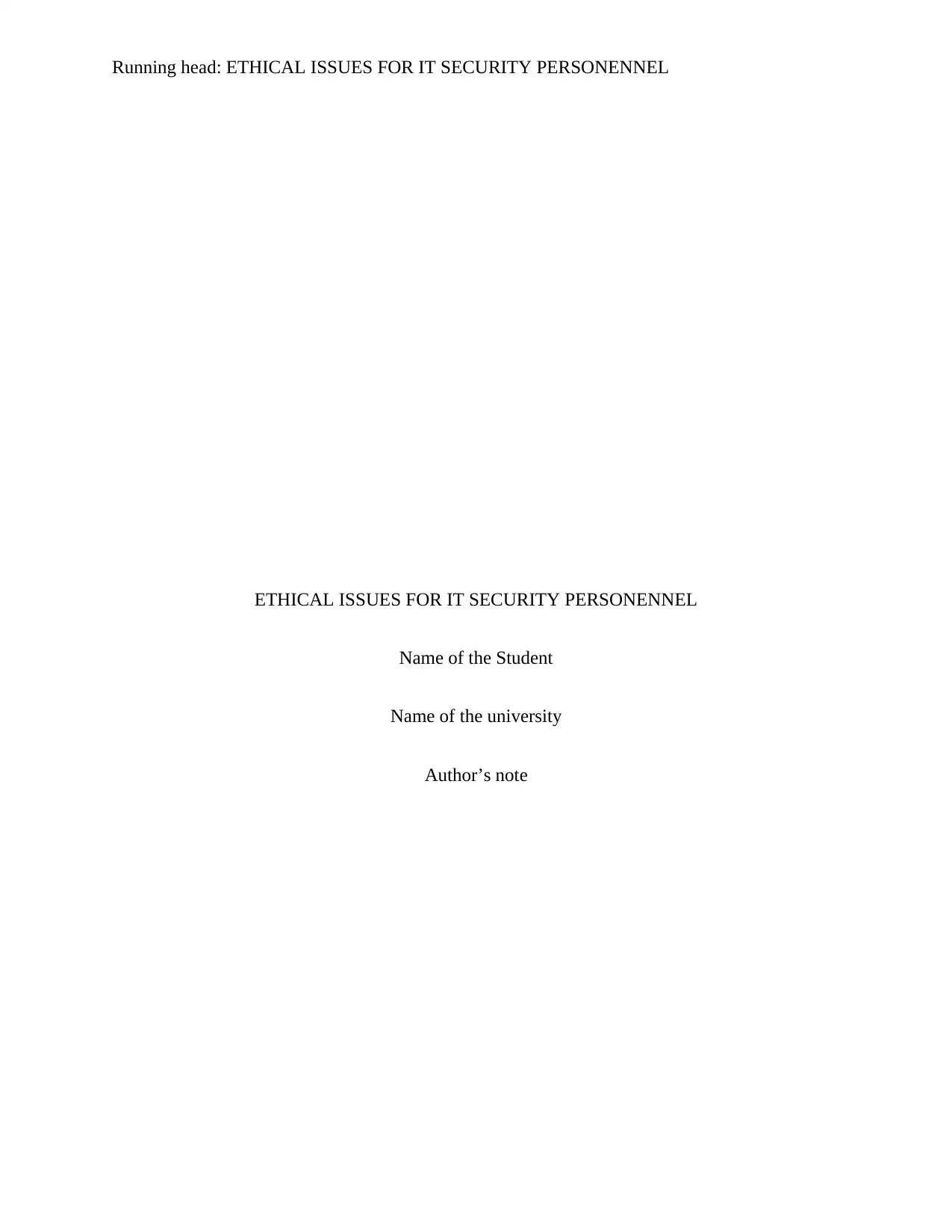
Running head: ETHICAL ISSUES FOR IT SECURITY PERSONENNEL
ETHICAL ISSUES FOR IT SECURITY PERSONENNEL
Name of the Student
Name of the university
Author’s note
ETHICAL ISSUES FOR IT SECURITY PERSONENNEL
Name of the Student
Name of the university
Author’s note
Secure Best Marks with AI Grader
Need help grading? Try our AI Grader for instant feedback on your assignments.
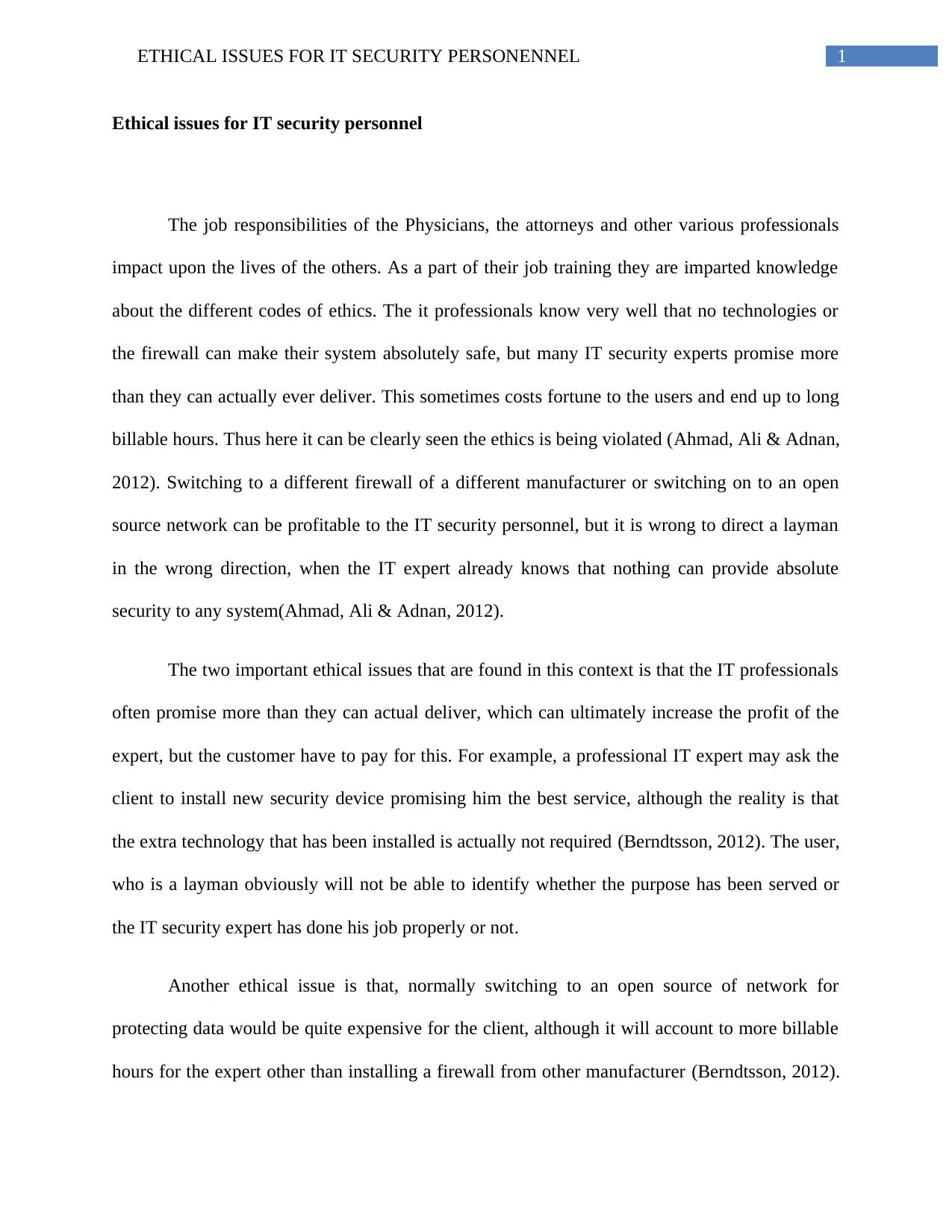
1ETHICAL ISSUES FOR IT SECURITY PERSONENNEL
Ethical issues for IT security personnel
The job responsibilities of the Physicians, the attorneys and other various professionals
impact upon the lives of the others. As a part of their job training they are imparted knowledge
about the different codes of ethics. The it professionals know very well that no technologies or
the firewall can make their system absolutely safe, but many IT security experts promise more
than they can actually ever deliver. This sometimes costs fortune to the users and end up to long
billable hours. Thus here it can be clearly seen the ethics is being violated (Ahmad, Ali & Adnan,
2012). Switching to a different firewall of a different manufacturer or switching on to an open
source network can be profitable to the IT security personnel, but it is wrong to direct a layman
in the wrong direction, when the IT expert already knows that nothing can provide absolute
security to any system(Ahmad, Ali & Adnan, 2012).
The two important ethical issues that are found in this context is that the IT professionals
often promise more than they can actual deliver, which can ultimately increase the profit of the
expert, but the customer have to pay for this. For example, a professional IT expert may ask the
client to install new security device promising him the best service, although the reality is that
the extra technology that has been installed is actually not required (Berndtsson, 2012). The user,
who is a layman obviously will not be able to identify whether the purpose has been served or
the IT security expert has done his job properly or not.
Another ethical issue is that, normally switching to an open source of network for
protecting data would be quite expensive for the client, although it will account to more billable
hours for the expert other than installing a firewall from other manufacturer (Berndtsson, 2012).
Ethical issues for IT security personnel
The job responsibilities of the Physicians, the attorneys and other various professionals
impact upon the lives of the others. As a part of their job training they are imparted knowledge
about the different codes of ethics. The it professionals know very well that no technologies or
the firewall can make their system absolutely safe, but many IT security experts promise more
than they can actually ever deliver. This sometimes costs fortune to the users and end up to long
billable hours. Thus here it can be clearly seen the ethics is being violated (Ahmad, Ali & Adnan,
2012). Switching to a different firewall of a different manufacturer or switching on to an open
source network can be profitable to the IT security personnel, but it is wrong to direct a layman
in the wrong direction, when the IT expert already knows that nothing can provide absolute
security to any system(Ahmad, Ali & Adnan, 2012).
The two important ethical issues that are found in this context is that the IT professionals
often promise more than they can actual deliver, which can ultimately increase the profit of the
expert, but the customer have to pay for this. For example, a professional IT expert may ask the
client to install new security device promising him the best service, although the reality is that
the extra technology that has been installed is actually not required (Berndtsson, 2012). The user,
who is a layman obviously will not be able to identify whether the purpose has been served or
the IT security expert has done his job properly or not.
Another ethical issue is that, normally switching to an open source of network for
protecting data would be quite expensive for the client, although it will account to more billable
hours for the expert other than installing a firewall from other manufacturer (Berndtsson, 2012).
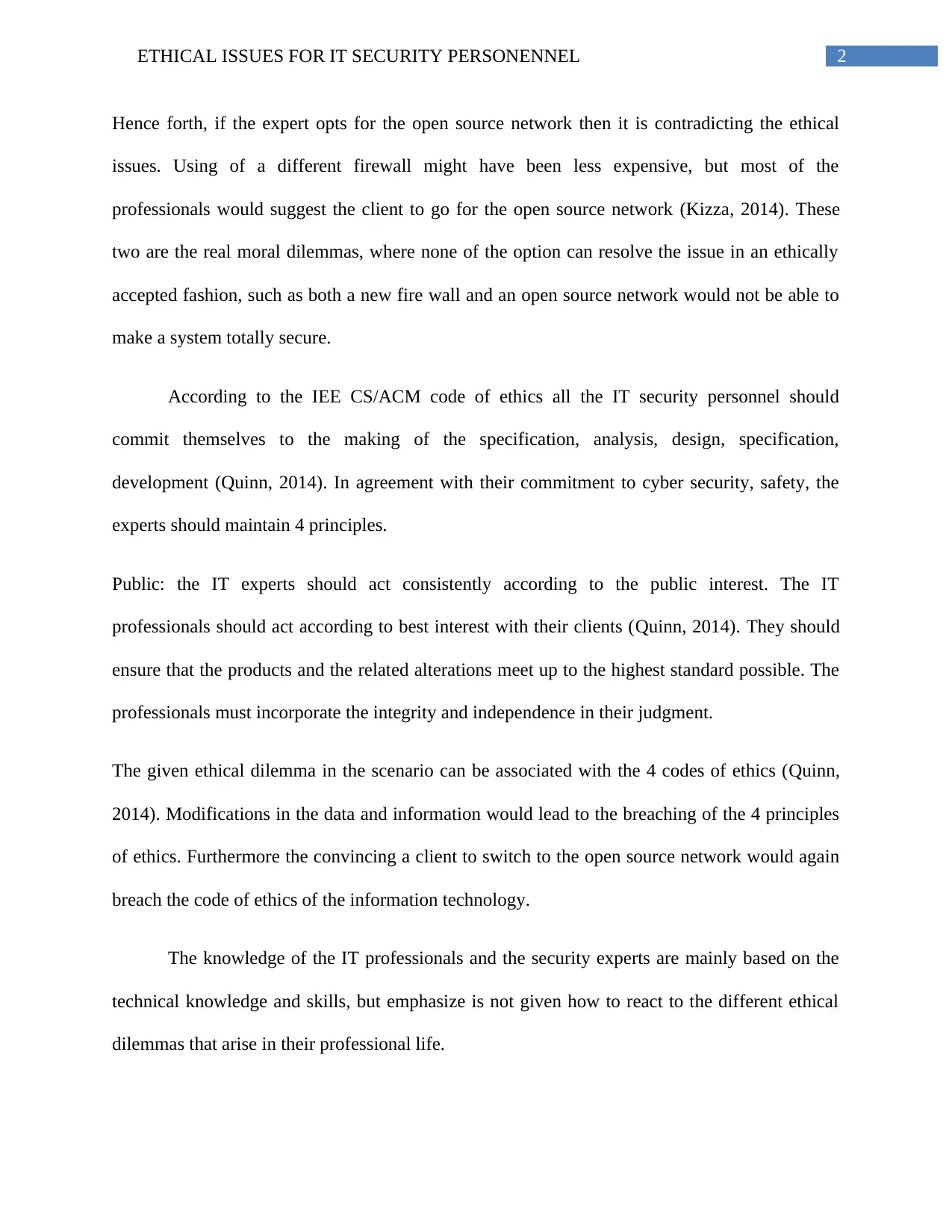
2ETHICAL ISSUES FOR IT SECURITY PERSONENNEL
Hence forth, if the expert opts for the open source network then it is contradicting the ethical
issues. Using of a different firewall might have been less expensive, but most of the
professionals would suggest the client to go for the open source network (Kizza, 2014). These
two are the real moral dilemmas, where none of the option can resolve the issue in an ethically
accepted fashion, such as both a new fire wall and an open source network would not be able to
make a system totally secure.
According to the IEE CS/ACM code of ethics all the IT security personnel should
commit themselves to the making of the specification, analysis, design, specification,
development (Quinn, 2014). In agreement with their commitment to cyber security, safety, the
experts should maintain 4 principles.
Public: the IT experts should act consistently according to the public interest. The IT
professionals should act according to best interest with their clients (Quinn, 2014). They should
ensure that the products and the related alterations meet up to the highest standard possible. The
professionals must incorporate the integrity and independence in their judgment.
The given ethical dilemma in the scenario can be associated with the 4 codes of ethics (Quinn,
2014). Modifications in the data and information would lead to the breaching of the 4 principles
of ethics. Furthermore the convincing a client to switch to the open source network would again
breach the code of ethics of the information technology.
The knowledge of the IT professionals and the security experts are mainly based on the
technical knowledge and skills, but emphasize is not given how to react to the different ethical
dilemmas that arise in their professional life.
Hence forth, if the expert opts for the open source network then it is contradicting the ethical
issues. Using of a different firewall might have been less expensive, but most of the
professionals would suggest the client to go for the open source network (Kizza, 2014). These
two are the real moral dilemmas, where none of the option can resolve the issue in an ethically
accepted fashion, such as both a new fire wall and an open source network would not be able to
make a system totally secure.
According to the IEE CS/ACM code of ethics all the IT security personnel should
commit themselves to the making of the specification, analysis, design, specification,
development (Quinn, 2014). In agreement with their commitment to cyber security, safety, the
experts should maintain 4 principles.
Public: the IT experts should act consistently according to the public interest. The IT
professionals should act according to best interest with their clients (Quinn, 2014). They should
ensure that the products and the related alterations meet up to the highest standard possible. The
professionals must incorporate the integrity and independence in their judgment.
The given ethical dilemma in the scenario can be associated with the 4 codes of ethics (Quinn,
2014). Modifications in the data and information would lead to the breaching of the 4 principles
of ethics. Furthermore the convincing a client to switch to the open source network would again
breach the code of ethics of the information technology.
The knowledge of the IT professionals and the security experts are mainly based on the
technical knowledge and skills, but emphasize is not given how to react to the different ethical
dilemmas that arise in their professional life.
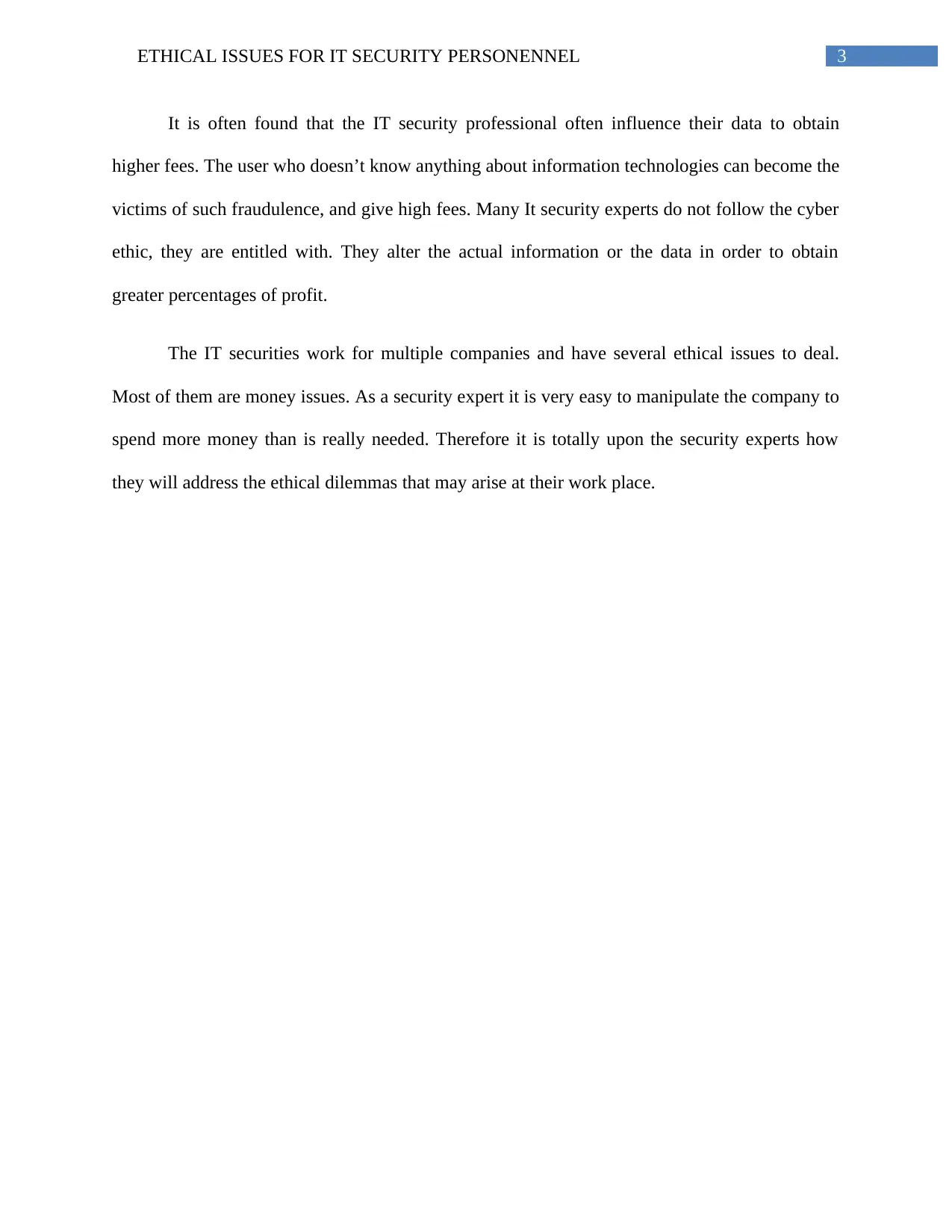
3ETHICAL ISSUES FOR IT SECURITY PERSONENNEL
It is often found that the IT security professional often influence their data to obtain
higher fees. The user who doesn’t know anything about information technologies can become the
victims of such fraudulence, and give high fees. Many It security experts do not follow the cyber
ethic, they are entitled with. They alter the actual information or the data in order to obtain
greater percentages of profit.
The IT securities work for multiple companies and have several ethical issues to deal.
Most of them are money issues. As a security expert it is very easy to manipulate the company to
spend more money than is really needed. Therefore it is totally upon the security experts how
they will address the ethical dilemmas that may arise at their work place.
It is often found that the IT security professional often influence their data to obtain
higher fees. The user who doesn’t know anything about information technologies can become the
victims of such fraudulence, and give high fees. Many It security experts do not follow the cyber
ethic, they are entitled with. They alter the actual information or the data in order to obtain
greater percentages of profit.
The IT securities work for multiple companies and have several ethical issues to deal.
Most of them are money issues. As a security expert it is very easy to manipulate the company to
spend more money than is really needed. Therefore it is totally upon the security experts how
they will address the ethical dilemmas that may arise at their work place.
Secure Best Marks with AI Grader
Need help grading? Try our AI Grader for instant feedback on your assignments.
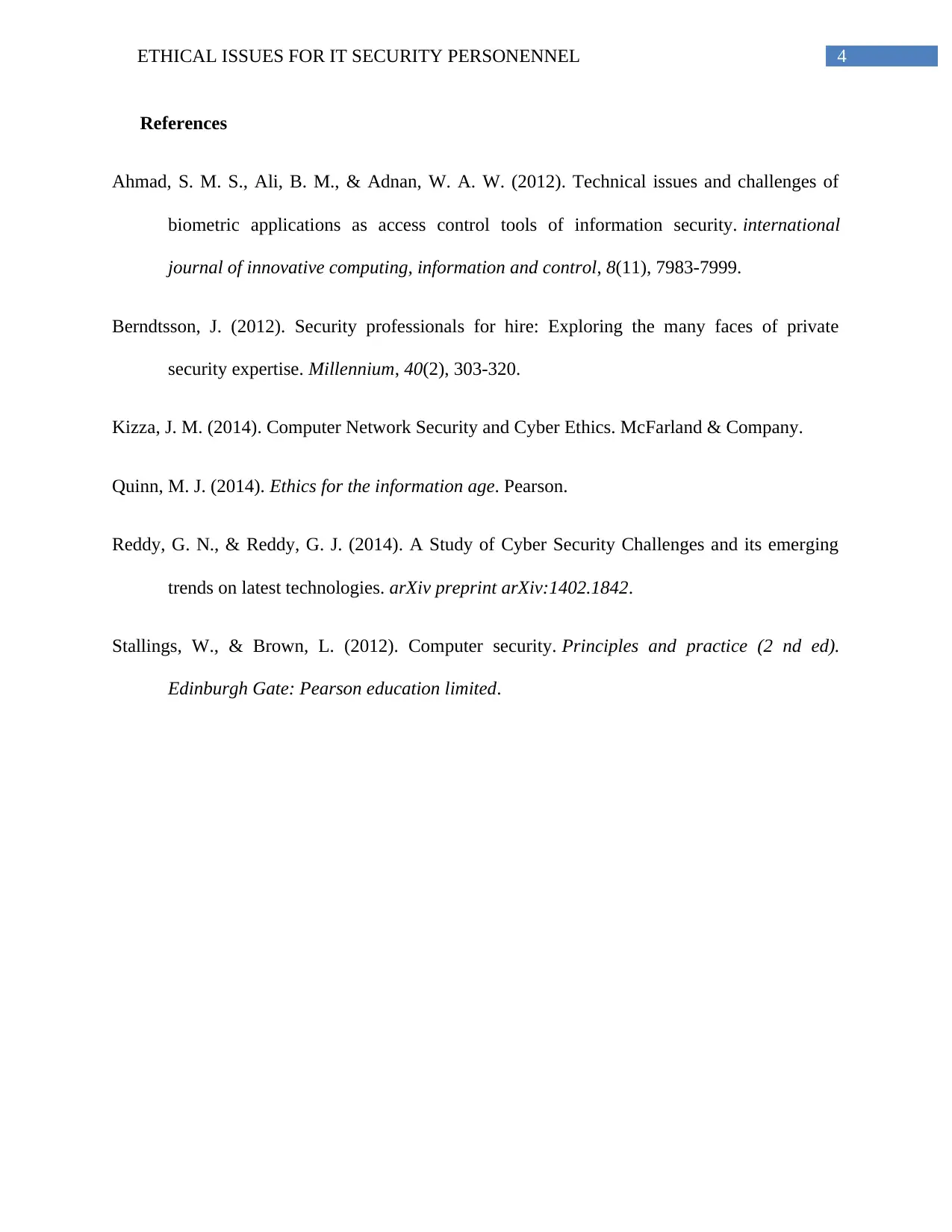
4ETHICAL ISSUES FOR IT SECURITY PERSONENNEL
References
Ahmad, S. M. S., Ali, B. M., & Adnan, W. A. W. (2012). Technical issues and challenges of
biometric applications as access control tools of information security. international
journal of innovative computing, information and control, 8(11), 7983-7999.
Berndtsson, J. (2012). Security professionals for hire: Exploring the many faces of private
security expertise. Millennium, 40(2), 303-320.
Kizza, J. M. (2014). Computer Network Security and Cyber Ethics. McFarland & Company.
Quinn, M. J. (2014). Ethics for the information age. Pearson.
Reddy, G. N., & Reddy, G. J. (2014). A Study of Cyber Security Challenges and its emerging
trends on latest technologies. arXiv preprint arXiv:1402.1842.
Stallings, W., & Brown, L. (2012). Computer security. Principles and practice (2 nd ed).
Edinburgh Gate: Pearson education limited.
References
Ahmad, S. M. S., Ali, B. M., & Adnan, W. A. W. (2012). Technical issues and challenges of
biometric applications as access control tools of information security. international
journal of innovative computing, information and control, 8(11), 7983-7999.
Berndtsson, J. (2012). Security professionals for hire: Exploring the many faces of private
security expertise. Millennium, 40(2), 303-320.
Kizza, J. M. (2014). Computer Network Security and Cyber Ethics. McFarland & Company.
Quinn, M. J. (2014). Ethics for the information age. Pearson.
Reddy, G. N., & Reddy, G. J. (2014). A Study of Cyber Security Challenges and its emerging
trends on latest technologies. arXiv preprint arXiv:1402.1842.
Stallings, W., & Brown, L. (2012). Computer security. Principles and practice (2 nd ed).
Edinburgh Gate: Pearson education limited.
1 out of 5
Your All-in-One AI-Powered Toolkit for Academic Success.
+13062052269
info@desklib.com
Available 24*7 on WhatsApp / Email
![[object Object]](/_next/static/media/star-bottom.7253800d.svg)
Unlock your academic potential
© 2024 | Zucol Services PVT LTD | All rights reserved.